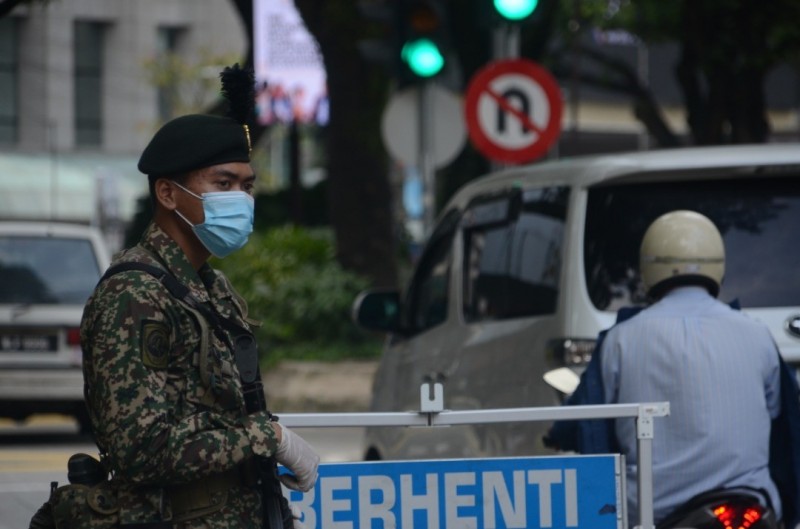
KUALA LUMPUR, May 20 — The American Malaysian Chamber of Commerce (AMCHAM) has rejected any proposed complete lockdown in any state or across Malaysia, even as daily Covid-19 infections surged to a historic high yesterday.
AMCHAM said implementing movement restrictions like the first Movement Control Order (MCO) in March last year, which shut down the economy for seven weeks, would impact the already hard hit local economy and lead to far-reaching repercussions for businesses located in Malaysia and their role in global supply chains.
“As of Q1 2021, the country is on the right trajectory for economic recovery. Imposing another lockdown will threaten this positive momentum, negatively impact investment sentiments, and once again call into question Malaysia’s reliability within the global value chains,” AMCHAM said in a statement yesterday.
“Drawing from the collaboration between industry and government and recognising the crucial role that Malaysian workers and businesses play in the supply chain network, we urge the government to implement best practices from previous MCOs.
“In adopting a whole-of-society approach, it is also imperative for every individual, family and community to do their part to ensure we achieve a balance between economic survival and public health.”
Yesterday, Selangor Menteri Besar Amirudin Shari said he was not completely opposed to the federal government’s proposed lockdown on Selangor, but said tighter movement restrictions should be accompanied by widespread Covid-19 testing, vaccination, and financial assistance for the low-income.
The Ministry of Health (MOH) reported a record high 6,075 new Covid-19 cases nationwide yesterday, as well as 46 coronavirus-related fatalities. MOH has also warned of almost full Covid-19 bed occupancy in hospitals and quarantine centres across the country, including near-capacity of intensive care units (ICU) with rising severe coronavirus cases.
The current nationwide MCO 3.0 scheduled until June 7 prohibits inter-district and interstate travel, public gatherings, as well as dine-ins, but permits economic sectors to continue operations. Employers are given the discretion to determine the proportion of operation or support staff who can come to the office.
AMCHAM said if a lockdown was inevitable, manufacturing and support services such as medical devices, electrical and electronics (E&E) including semiconductor, and information and communication technology (ICT) and their supporting small and medium industries (SMEs) must be allowed to continue operations.
“AMCHAM reiterates its recommendation to allow businesses to self-regulate operational capacity, even if headcount is limited to only 50 percent on-site at any given time. With no working hour restrictions, companies will be able to implement rotations and split shifts, supporting the needed social distancing and Safe@Work bubbles,” AMCHAM said.
Safe@Work is an initiative introduced by the Ministry of International Trade and Industry that recommends isolating workers identified as close contacts of positive Covid-19 cases from their coworkers and the community.
AMCHAM also urged the government to communicate standard operating procedures (SOPs) clearly and consistently, criticising the HIDE predictive analytics system that the government claims is able to predict Covid-19 clusters. HIDE’s list published May 8 targeted most major shopping centres and supermarkets in the Klang Valley.
AMCHAM further called for advanced notice of any movement restrictions and scenario planning with “clearly set criteria” to enable businesses to plan ahead “without facing the disruptive task of juggling ever-changing SOPs which update as frequently as on a daily basis.”
“The methodology behind the Hotspot Identification for Dynamic Engagement (HIDE) system remains opaque, and there has been much confusion caused by the recent spate of media coverage on federal versus state government procurement of vaccines. These examples erode both public and business confidence in Malaysia in handling the pandemic,” said AMCHAM.
Vaccine Minister Khairy Jamaluddin yesterday described the purported offer by a private company to donate two million doses of Sinovac’s Covid-19 vaccine to the Penang state government as a “scam”.
He also said he has informed the Sarawak state government that it did not need to purchase Sinovac vaccines, besides questioning when Selangor would receive the coronavirus vaccines the state government claimed it had purchased.
Khairy said he has instructed local pharmaceutical company Pharmaniaga Bhd — which is undertaking the fill-and-finish process for Sinovac’s Covid-19 vaccines — to prioritise fulfilling the federal government’s order of 12 million doses of Sinovac’s vaccine ahead of orders by state governments, including by importing the finished vaccines from China. Pharmaniaga said last May 11 that it had only rolled out 290,480 doses of the filled and finished Sinovac vaccines.
AMCHAM called for expedited Covid-19 vaccination upon arrival of further supplies, saying that private hospitals and clinics should be equipped to roll out the vaccines. Less than 1.3 million people in Malaysia’s 32.7 million population have received at least one dose of the Covid-19 vaccine as of May 18.
“Industry is similarly ready with their resources and infrastructure to support the roll-out of the industry vaccination program, including on-site vaccinations for industry.”
Source: https://codeblue.galencentre.org/2021/05/20/amcham-opposes-total-lockdown-for-any-state-nationwide-malaysia/

